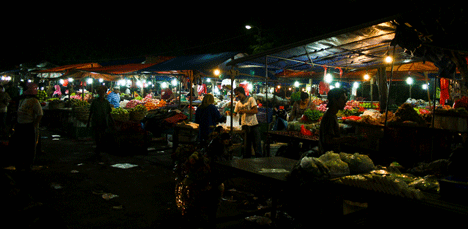On Jalan Gajah Mada, Denpasar there are Badung and Kumbasari Markets. Both these markets have become significant for Denpasar dwellers, as they are categorized into a complete market. Diverse goods are on sale here, ranging from daily needs, fabrics, food up to ceremonial ingredients for Hindu's. There are also inexpensive handicraft products that are on offer at Kumbasari Market. But, be sure to enter the right market as Kumbasari Market is adjacent to Badung Market; they are just separated by the river. Kumbasari Market is located on the west side and Badung on the other.
Formerly, Kumbasari Market was named Pasar Priuk, which especially sold kucit (suckling pig). In 1977, this market was restructured with four-floors with each floor selling different goods.
On the first floor, merchants sell various daily needs, like fruits (southern street side), meat (at southern market stalls) and assorted perishable cakes, and bakery (northern). If entering the market stalls, just under the building, visitors will find many shops that sell diverse ingredients for Hindu ceremony like that for ngaben (cremation), melaspas (inaugural rites) and miscellaneous temple ornaments.
On the southern side, merchants sell many daily needs such as rice, vegetables and kitchen spices. Merchants on the second floor nearly all sell fabrics, school uniforms, various daily garments ranging for kids up to adults. There is also a shop that sells costumes for Balinese dance.
On the third and fourth floors is sold varied handicraft products made by Bali's craftsmen. They are wooden statues of many figures, bags, kites, slipper, ashtrays, embroidery and so forth.
Shops at Kumbasari Market open at 07.00-17.00, but some may offer their goods until late night depending on the number of visitors. Special for merchants of vegetables, fruit, young coconut leafs and some others are sold from open cars, thronging the parking lot from night until dawn.
Kumbasari Market is not only visited by the local people of Bali, but also by domestic and foreign visitors. They usually look for art articles, or just browse the market which has become a daily activity for the Balinese.
Wayan, a merchant, told us that in 1982 goods that were best favored by tourists consisted of bags, fabrics, kites, slippers and some souvenirs with new motives. While, the art products that are made of wood like statues and masks are nearly unsold. I Putu Gede a stall employee told us that he occasionally feels ashamed of his boss. Why? "Because we are paid by our boss. Then, if we cannot sell something where does he get money from to pay us?" he asked while adding that he was paid Rp 300,000 a month. This sluggish condition is also experienced by other merchants locate in the market stalls.
They also sigh since they hardly ever get any buyers. "They do not even get buyers, at times, let alone visitors who come to market stalls. Anyway, I am incessantly charged a royalty fee every day," said Ni Ketut Sutini, a merchant of Hindu ceremonial ingredients at a market stall. On the contrary, the merchants of cake, fruit and meat sell their goods every day. "Even though it is not so busy, we thank God that we can sell some of our goods," said Ni Made Wati, a meat merchant.
Teks by Nyoman Sucitasari, SE
More info :

